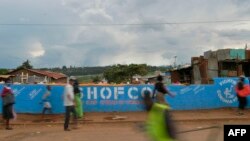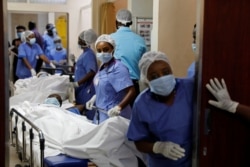Kenya's Ministry of Health will start mass testing of the population to contain the spread of the coronavirus. The first phase of the testing will prioritize high-density areas such as the slums of Nairobi, and high-risk areas such as hospitals and quarantine centers.
Twenty-nine-year-old Lilian Chao contracted a mild cough less than two weeks after doctors confirmed Kenya’s first COVID-19 case in Nairobi.
She thought the cough would go away after a couple of days, but it persisted.
It is only after Chao’s close colleague died from the coronavirus that Chao suspected her cough might be something worse.
“It was reported that one of our colleagues who died had COVID-19 and we had been in contact with her, together with a friend of mine, who we were experiencing the same symptoms. Doctors took us into quarantine, when my symptoms went down, I went back to work, we both did. The systems got stronger and we were taken for testing. The results came back positive,” she said.
Both Chao and her friend are now among dozens held in an isolation unit at Coast General Hospital in the city of Mombasa.
Because of cases like those, Kenya's Ministry of Health announced Tuesday that it would start mass testing of the population to contain the spread of the virus.
In Nairobi, Minister of Health Mutahi Kagwe said high-risk clusters would be given priority, including slum areas, hotels, hospitals, quarantine centers and isolation facilities.
“But who to test? You have got to move in a very targeted manner in order for that testing to be effective. For example, if you know than an institution has had one or two individuals who have tested positive, it makes sense to say, lets first of all round up this institution and test all those workers that have been with that person," he said.
The government said it has deployed 12,000 testing kits to areas that it had identified as high risk.
Kenya's number of coronavirus cases has steadily risen over the past month. The virus has been found in at least 21 of 47 counties since the first case was reported on March 13.
In previous weeks, the World Health Organization warned that African countries were not getting accurate figures on the extent of coronavirus cases due to a lack of robust testing.
Kenya's Ministry of Health has been testing an average of 400 samples per day. But on Tuesday, the country tested more than 800 samples in 24 hours, the highest figure so far.
Kenya has confirmed 225 cases of the virus and recorded 10 deaths.





